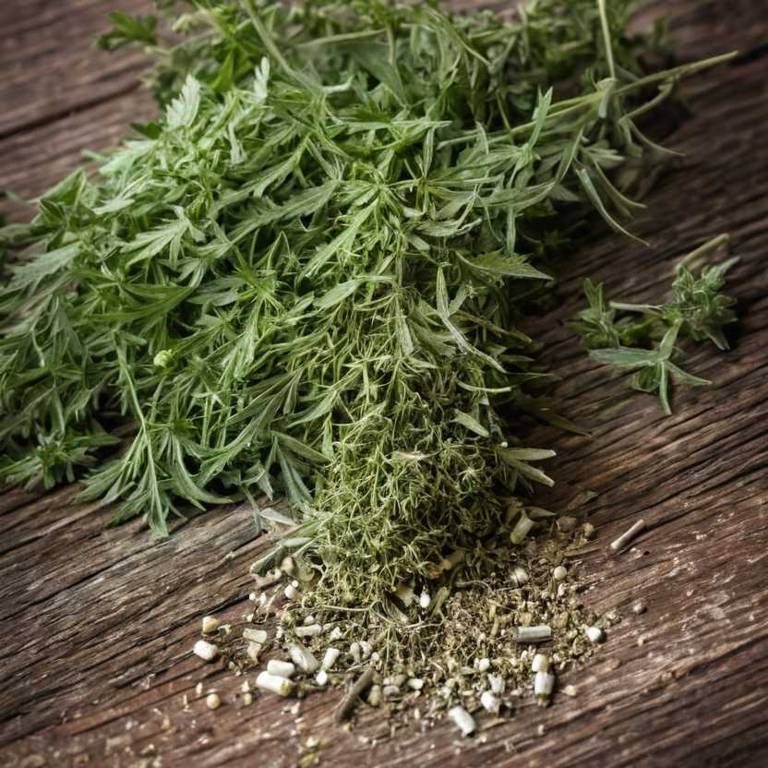By Leen Randell
Updated: Jul 05, 2024
What Are The Medicinal Properties Of Artemisia Absinthium (Wormwood)?

Artemisia absinthium, also known as wormwood, has health benefits such as reducing fever and inflammation, as well as acting as a natural antiseptic.
Its medicinal constituents include thujone, camphor, and borneol, which contribute to its therapeutic properties. Wormwood is often prepared as a tea, tincture, or essential oil for medicinal use. Possible side effects include nausea, headaches, and seizures, especially when consumed in excess.
Precautions should be taken when using wormwood, particularly for pregnant or breastfeeding women and individuals with liver or kidney issues.
This article explains the health benefits, active constituents, medicinal preparations, possible side effects, and precautions related to Artemisia absinthium.
- What are the health benefits of Artemisia absinthium?
- What are the active constituents of Artemisia absinthium?
- What are the medicinal preparations of Artemisia absinthium?
- What are the possible side effect of using Artemisia absinthium improperly?
- What precautions to take when using Artemisia absinthium medicinally?
What are the health benefits of Artemisia absinthium?
Artemisia absinthium, also known as wormwood, has health benefits such as reducing inflammation and relieving digestive issues.
Its essential oils have antiseptic and antimicrobial properties, making it effective in treating wounds and infections. Wormwood has also been traditionally used to treat liver and gallbladder problems, as well as to reduce fever.
Additionally, its active compounds have been shown to have antimalarial and antiparasitic effects.
Here's a detailed article about the 10 health benefits of Artemisia absinthium.
What are the active constituents of Artemisia absinthium?
Artemisia absinthium, also known as wormwood, has active constituents such as thujone, a volatile oil composed of pinene, borneol, and sesquiterpenes.
Thujone's sedative and antispasmodic properties are said to reduce pain and inflammation. Artemisia's bitterness is attributed to the sesquiterpene absinthol and sesquiterpenes.
Additionally, artemisinin, a sesquiterpene lactone, is an antimalarial and antiparasitic agent, making wormwood a valuable source for traditional medicine.
Here's a detailed article about the 10 active constituents of Artemisia absinthium.
What are the medicinal preparations of Artemisia absinthium?
Artemisia absinthium, also known as wormwood, has medicinal preparations such as tinctures, infusions, and essential oils.
These preparations are used to treat various ailments including fever, digestive issues, and skin conditions. The oil extracted from the plant's leaves and flowers is used in traditional medicine to relieve pain and inflammation.
Wormwood is also used in homeopathic remedies for its anthelmintic properties to treat parasitic infections.
Here's a detailed article about the 10 medicinal preparations of Artemisia absinthium.
What are the possible side effect of using Artemisia absinthium improperly?
Improper use of Artemisia absinthium, also known as wormwood, increases the chances of experiencing side effects such as headaches, dizziness, and nausea.
It can also cause digestive issues, including stomach pain and diarrhea. Long-term use has been linked to kidney damage and liver toxicity. Additionally, high doses can lead to seizures, confusion, and altered mental states.
The herb is toxic and should only be consumed in small amounts under the guidance of a healthcare professional.
Here's a detailed article about the 10 most common side effects of Artemisia absinthium.
What precautions to take when using Artemisia absinthium medicinally?
Before using Artemisia absinthium, also known as wormwood, for medicinal purposes, you must take precautions such as consulting with a healthcare professional, especially if pregnant, breastfeeding, or taking certain medications.
It's also essential to use high-quality, organic wormwood and follow recommended dosages, as excessive consumption can cause adverse effects like liver damage, seizures, or allergic reactions.
Proper identification of the plant is also crucial to avoid confusion with similar-looking species.
Here's a detailed article about 10 precautions to take when using Artemisia absinthium.